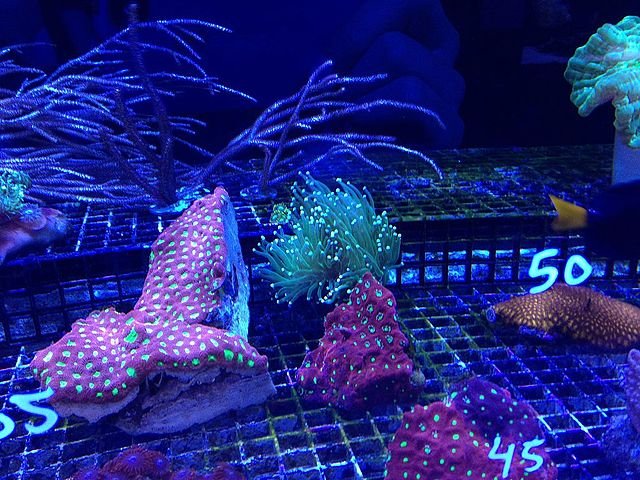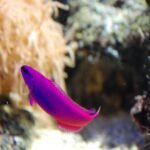UK.- Pioneering new techniques will enable leading aquarium visitor attractions to breed their own tropical fish, following a new collaboration.
The larvae of many tropical fish species are so small, that they are invisible to the naked eye, and their food source is even more microscopic. This makes captive breeding of these fish challenging.
But aquaculture experts at Bangor University believe that they can help the aquarium industry to develop techniques to rear their own coral reef fish from captive larvae.
The Zoological Society of London (ZSL), The Deep and SEA LIFE, three of the UK’s leading aquariums are working with Bangor University’s School of Ocean Sciences to develop ways of breeding and farming coral reef fish. This collaboration is part-funded by the European Regional Development Fund through the Welsh Government’s SMARTExpertise programme.
Concern over the sustainability of wild collection is the driver for the aquarium sector to search for sustainable alternatives in order to reduce the ecological impact of the trade on the world’s coral reefs.
Brian Zimmerman, Chief Curator at ZSL, explained their position:
“We no longer purchase wild collected reef fishes; our fish are either bred on site or purchased captive bred elsewhere. There are recent efforts to try and supply an increasing number of captive bred species and the list of those available gets longer every year. However, the techniques for breeding marine fishes are complex and different for every species. Progress in mastering new species is slow and takes considerable investment to achieve marketable numbers reliably. Conversely, however, demand is high as aquariums start to question the sustainability of their stock acquisitions more carefully and to seek out captive bred fish for display.”
The new project, SustaiNable Aquariums Project (SNAP) aims to increase the number and diversity of sustainably and ethically produced coral reef fish species for the aquarium community, and improve the global sustainability of the trade in coral reef fish.
Stay Always Informed
Join our communities to instantly receive the most important news, reports, and analysis from the aquaculture industry.
An initial 20 tropical reef species, popular in aquariums but which have not yet been successfully captive-bred are the initial focus of the project. These include species of butterflyfish, rabbitfish, wrasse and tangs.
Working hand in hand with the aquariums, who will supply the larvae, the scientists will develop new or improved hatchery production techniques, and technology and extend biological knowledge.
If successful, the project could lead to the first commercial hatchery for these species in Europe, based in Wales, supplying aquariums and hobbyists across the continent.
As Tom Galley, part of the research team at Bangor University explained:
“Fish developed in hatcheries are widely recognised as having advantages over their wild collected counterparts, such as being pre-adapted to life in captivity. However, for this to become a reality a significant amount of work is required.”
Nick Jones, from Bangor University, also part of the research team on the project explained:
“The difficulty in rearing the majority of coral reef fish lies in the small size of their delicate larvae, a poor understanding of appropriate larval rearing environments, plus the lack of suitably sized and nutritious larval food items. These are issues we hope to resolve during the three year project.”
Jean-Denis Hibbitt, Breeding and Positive Change Programmes Coordinator at SEA LIFE’s Conservation, Welfare and Engagement Department said:
“SEA LIFE works to ensure that all our animals come from ethical and traceable sources. Many of our animals come from our global breeding programmes as well the rehoming of animals that cannot care for themselves. Those animals that do come from external suppliers must pass through our stringent supplier accreditation process. However, the live trade of reef fish, particularly for the ornamental hobbyist market is a large industry and its future sustainability is uncertain. We are already working in this area, however, this project is set to make a significant impact by providing us and others with sustainably reared specimens.”
Graham Hill, Head of Animal Care and Research at Hull’s The Deep said
“It is crucial that zoos, aquariums and academics pursue pioneering work to advance our understanding of marine ?sh species. This collaborative breeding project brings together our collective expertise to develop the necessary skills and techniques to push marine ?sh breeding and rearing forward. The project will have a direct impact on developing a better understanding of the breeding cycles of commonly kept species in aquariums, and has the potential to reduce the removal of animals from wild populations and establish a scienti?cally based foundation for a more sustainable industry.”
Source: Bangor University
Editor at the digital magazine AquaHoy. He holds a degree in Aquaculture Biology from the National University of Santa (UNS) and a Master’s degree in Science and Innovation Management from the Polytechnic University of Valencia, with postgraduate diplomas in Business Innovation and Innovation Management. He possesses extensive experience in the aquaculture and fisheries sector, having led the Fisheries Innovation Unit of the National Program for Innovation in Fisheries and Aquaculture (PNIPA). He has served as a senior consultant in technology watch, an innovation project formulator and advisor, and a lecturer at UNS. He is a member of the Peruvian College of Biologists and was recognized by the World Aquaculture Society (WAS) in 2016 for his contribution to aquaculture.




